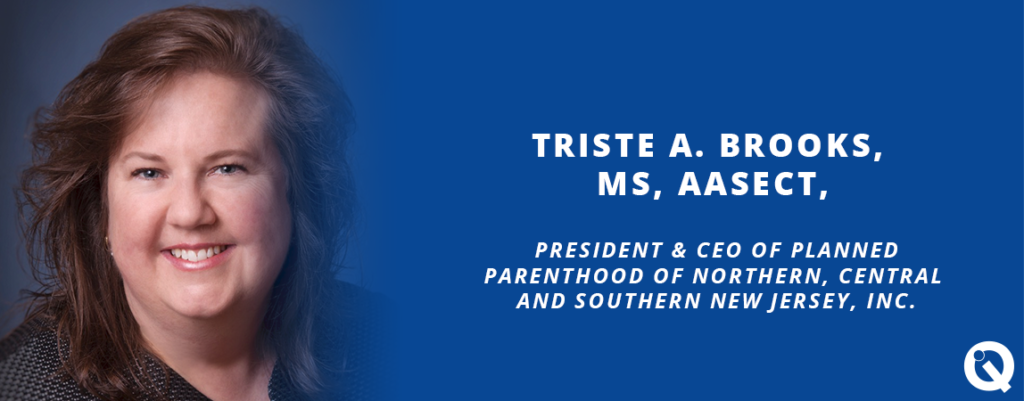Triste A. Brooks, MS, AASECT, is President and CEO of Planned Parenthood of Northern, Central and Southern New Jersey, Inc. The organization is a member of the Quality Institute’s Leadership Council.
What are some of the most common barriers your patients in New Jersey face in accessing reproductive health care?
At Planned Parenthood, we believe that access to care shouldn’t depend on who you are, your income, your insurance status, or your immigration status. Yet even in New Jersey, our patients face barriers to care. Medically unnecessary regulations in place in our state inhibit the availability of reproductive health care services, including restrictions that prevent qualified health care providers from providing abortion care, and limits on the types of medical settings in which an abortion can be performed.
Additionally, our patients often face financial barriers to care, many of which have been worsened by the impacts of the COVID-19 pandemic. For example, a couple came to our Shrewsbury health center. The mother and father both lost their jobs, and they had several kids at home. They really wanted to maintain their form of birth control. We don’t turn people away due to an inability to pay, so of course we saw and helped them.
We’re also seeing the brunt of the COVID-19 pandemic falling hardest on those struggling to make ends meet and who are already failed by our health care system. Communities of color and immigrant community members are disproportionately impacted due to systemic racism and historic underinvestment in these communities. Economic barriers including loss of income and health insurance, and the limited ability to travel, conspire to push time-sensitive care out of reach.
What steps should other parts of the health care system, such as payers and hospitals, take to increase the accessibility and quality of reproductive health care?
One of the most important things that the health care system can do is to treat reproductive health care like the health care it is — and not treat it significantly differently from other types of health care. That’s one of the principles behind the Reproductive Freedom Act. This recently introduced legislation will help protect and expand New Jerseyans’ ability to receive reproductive health care, such as birth control, and pregnancy-related care, including abortion.
In addition to supporting this legislation, given that reproductive health care services are often very time-sensitive, payers and hospitals should ensure that there aren’t any additional barriers to accessing contraception or abortion. One example of this kind of barrier would be requiring referrals or prior authorization for abortion services, even though a person’s insurance plan already covers abortion care.
What do you wish more people knew about Planned Parenthood and the services your health centers offer?
At Planned Parenthood of Northern, Central, and Southern New Jersey, we provide high-quality, comprehensive, accessible, and affordable reproductive health care services, emphasizing privacy, confidentiality, dignity, and self-determination. We advocate for public policies that guarantee these rights and ensure access to such services, and we provide and support education programs that expand understanding of human sexuality. We provide a full range of preventive reproductive health care services, including lifesaving cancer screenings, birth control, and testing and treatment for sexually transmitted infections and HIV/AIDS, and we are proud to provide abortion care. We ensure that our patients have accurate information about all of their health care options. For many of our patients, we are their only provider. We can’t help them with all their needs, but we can provide essential care and connect our patients to additional community resources every day.
Planned Parenthood has provided both in-person care and telehealth during COVID-19. How have your health centers adapted to provide sexual and reproductive health care during the pandemic?
Throughout the pandemic, our health center doors have remained open, and we have taken precautions in line with CDC and NJDOH guidance to reduce the risk to our patients and staff. We have worked to ensure that our patients did not, and will not, lose access to the essential health care services they rely on. We also rolled out telehealth services, ensuring that individuals who faced barriers to coming to a health center in person can still get the care they need. These services will provide a positive impact for our patients long after the pandemic is over.
We know that access to health care is essential, and, right now, people need more care, not less. The need for reproductive health care does not stop during a pandemic: sexually transmitted infections, urinary tract infections, birth control, abortion, and other essential health issues can’t wait.
So we can learn more about you outside of your work, where could we expect to find you on a sunny weekend day when you are not working?
You would likely find me with my beloved dog, Frankie. My husband Lawrence and I rescued him about 13 years ago and he brings us so much joy. Lawrence and I also love traveling in non-pandemic times. I have also been training at a local gym. I love kickboxing and krav maga.

